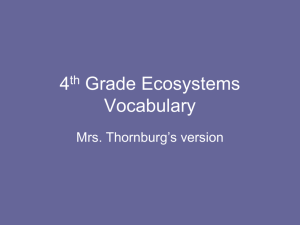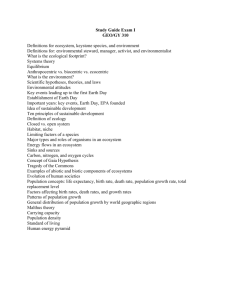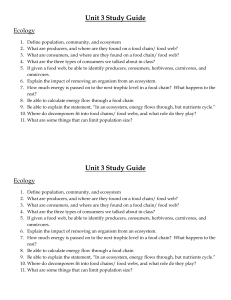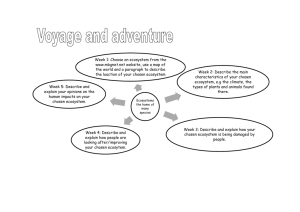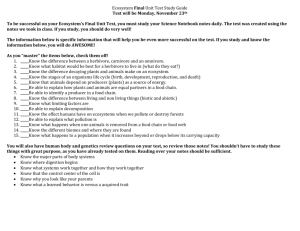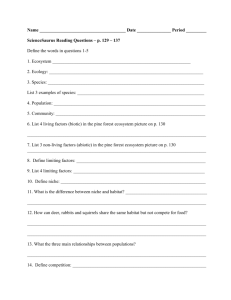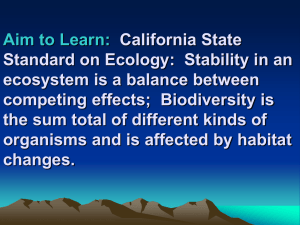Living Things Affect Ecosystem
advertisement
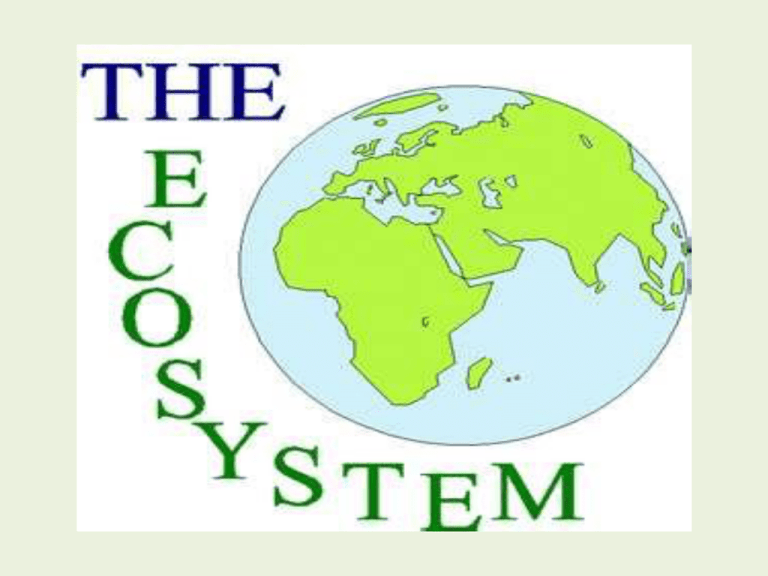
EQ: What is an ecosystem? Vocabulary Words Environment Ecosystem Population Community Ecosystems All living things around you make up the environment. An environment includes living things and nonliving things. Living things include people, animals, and plants. Nonliving things include soil and weather. Ecosystems All the things that interact in an environment make up an ecosystem. An ecosystem has two parts- living and nonliving things. An ecosystem can be small or large, wet or dry, cold or hot. Individuals and Populations One deer is an individual. A group of deer is called a population. A population is a group of the same kind of plant or animal living in the same ecosystem. Individuals and Populations Individual Population Communities Amazon Rain Forest Blue Ridge Mountains Plants, animals, and people live together. They live in a community. A community is all the populations that live in the same place. Look at these different communities. Review Questions • What is an ecosystem? Give an example. • What are the 2 parts of an ecosystem? Give and example. • What is the difference between individual and populations? Give an example. • What is a community? EQ: What are the roles of producers, consumers, and decomposers? Vocabulary Words –producer –omnivore –consumer –herbivore –carnivore –decomposer Producers Any living thing that makes its own food is called a producer. Plants are producers. Producers can be small, like moss, or large, like an oak tree. Consumers An animal that eats plants or other animals is called a consumer. Consumers cannot make their own food. Consumers must eat other living things. Kinds of Consumers There are 3 kinds of consumers, herbivores, carnivores, and omnivores. Decomposers A decomposer eats dead plants or animals. Decomposers also break down waste. Earthworms are decomposers. They eat dead plants. Fungi are decomposers too. They break down wood from dead trees. Review Questions • • • • • What are producers? What are consumers? Describe the 3 kinds of consumers. Give an example of each kind of consumer. What are decomposer and how do they help the Earth? EQ: How does energy flow through an ecosystem? Vocabulary Words – habitat – niche – food chain – prey – predator – food web – energy pyramid Habitats A habitat is an environment that meets the needs of a living thing. An insect’s habitat can be small as the space under a rock. A migrating bird’s habitat can cross a continent. Types of Habitats Niche Each living thing in a habitat, has a role, or niche. A niche is how a living thing works within an ecosystem. A niche includes these things: • where a plant or animal lives • how it reproduces • where the animal gets its food • how an animal stays alive What is the niche of the lion in the picture? Food Chains A food chain shows the path of food energy. Most food chains start with producers, or plants that get energy from the sun. Prey and Predators Consumers that are eaten are called prey. Consumers that eat prey are called predators. Can you locate the prey and the predators in the picture? Food Webs A food chain shows how an animal get energy. When food chains cross, they make food webs. Food webs can be on land and in the ocean. Food Webs Top Level Consumers Eats 2nd level consumer but when top level consumers die, decomposers help break down their remains 2nd Level Consumers Eats a first level consumer 1st Level Consumers at the bottom of food web. They each producer Energy Pyramid An energy pyramid shows how much energy is passed on from one thing to another. Producers are at the bottom of the energy pyramid. Energy Pyramid Review Questions • What is a habitat? Give an example. • What things are included in a niche? • Describe the difference between a food chain and a food web. • Give examples of a prey and predator. How are they different? • What does an energy pyramid show? Give an example? EQ: What factors influence ecosystem? Vocabulary Words – abiotic – biotic Living Things Affect Ecosystem Plants and animals are the living parts of an ecosystem. Living parts of an ecosystem are biotic, which means they are living. Living Things Affect Ecosystem 2. Birds and deer spread seeds. This causes the plants to grow in new places. Plants and animals affect the ecosystem in many ways. HOW? 1.Plants are food for animals, so if a plant dies, there is less food for the animals. Non - Living Things Affect Ecosystem Soil Sunlight Water Ecosystems have no living parts also. Sunlight, air, water, and soil are nonliving. These nonliving parts of an ecosystem are called abiotic. Climate Affect Ecosystem Climate also affect an ecosystem. It affects the soil, the plants that grow in an ecosystem, and the animals that live in an ecosystem. How do you think the climate has affected these ecosystems? Think about the soil, animals, and plants that may thrive there. Review Questions • Describe the difference between abiotic and biotic. Give examples. • How does climate affect an ecosystem? • How does living and non living things affect and ecosystem?
